

Presentation Psychology: Proven Strategies To Truly Connect With Your Audience
Table of contents, does psychology play a role in creating effective presentations.
Psychology plays a huge role in creating an effective presentation. Although you never probably thought about how psychology itself is incorporated into a presentation, you’ve probably come across psychological tips in other presentation articles such as how to be a better presenter .
Many of the presentation tips and tricks in these articles have roots in psychology.
For example, you might have been told before to really focus on your audience and understand who they are. That’s because everyone’s psyche is different.
If they are auditory learners, you would want to focus your attention on your public speaking skills, vocal pitch and the way you speak. You may also want to consider how your speech is coming across.
Is it clear and slow-paced so the audience is able to absorb all the information? On the other hand, you may be speaking too fast and the audience’s attention is fragmented due to information overload.
If they are visual learners, you might want to incorporate a lot of images or a video to help present new ideas or information.
Learning styles is only one aspect of how presentations incorporate psychology. Learning styles may help you understand how people absorb information because this is how they learn but there are other aspects to consider.
You may want to research and explore what arouses people, what motivates them such as Maslow’s hierarchy of needs and what people may avoid due to fear or past trauma.
7 Psychology-Proven Presentation Tricks
Now that we know for certain psychology plays a role in creating effective powerpoint presentations, we’ve put together 7 research backed tips on how to enhance your upcoming presentation.
1 – Build A Structure

The human brain loves structure.
Whether you realize it or not, our brains try to structure all the little points and details of the world to help us better understand it. Structure allows us to take the big picture and divide it up into smaller, more manageable pieces. This same concept applies to presentations as well.
When a presentation is structured, your audience will be able to retain the information 40% more reliably and accurately compared to if your presentation was more free thought. If you’re able to help give your audience a clear structure, you will reduce the cognitive load required by them to remember key points.
If your presentation is easier for them to remember, then they will more likely consider it to be a good presentation.
2 – Apply The Rule Of Three

You’ve probably heard of the rule of three in writing.
Most writing professionals and writing courses teach you to write using the rule of three in order to create a memorable piece of content .
The premise of the rule of three stems off the first tip mentioned above which is that our brains love structure, organization and patterns.
If information or ideas can be structured in buckets of three, it will make for it to be easily recalled. Information that is easily remembered will leave a longer lasting impact on your audience.
You can use the rule of three to your advantage in your presentation by coupling the important points into three categories. If you feel like you need to mention more information, reconsider.
Make a list of all the main points you want your audience to remember and try to group them into three buckets. If you can’t, then the outliers must not be relevant enough for your presentation and you may need to consider breaking it up into smaller, more digestible presentations.
3 – Change Every 10 Minutes

If you have a presentation the audience is genuinely interested in, the typical audience attention span is between seven to ten minutes .
Using the two tips mentioned above, you should be able to condense your three points into a ten minute presentation.
If you go over ten minutes, you’ll begin to lose the attention of your audience before you even reach the final slide. If you must go over ten minutes, try changing things up a bit.
Whether it’s the content of your presentation or delivery method, be sure to add lots of changes in it to keep it lively.
4 – Use Emphasizing Visual Communication

Now that you know what the main idea of your presentation is and have condensed it in an organized structure with no more than three topics, you can begin enhancing your presentation with visuals.
Visual cues such as graphs, charts and tables are great tools to deliver complex information in a more digestible way.
If creating visuals isn’t your thing, don’t let that stop you from creating effective presentations.
Instead, consider outsourcing your presentation design .
Luckily, there are presentation design services which can help you not only develop amazing presentations, but also develop other visual cues such as sizzle reels.
Many presenters tend to use overused presentation templates that students and other presenters have used a million times over. The effectiveness of these templates have been diluted to almost nothing.
Whether you’re a manager of a Fortune 500 needing to present financials or a psychology professor needing to put together a psychology presentation on mental disorders and mental health, Presentation Geeks have serviced multiple industries to support their presentation needs.
5 – Use Impactful Headlines

One of the first things people notice when reading something is the headline.
It takes less than seven seconds for someone to make a first impression and within that first seven seconds, they’re reading your headline.
Whether it’s the beginning slide or another single slide to follow throughout the presentation, headlines are critical.
Make sure your headlines aren’t an overload of information. In this case, less is more. Make it concise and impactful.
6 – Don’t Read The Slides

Reading from the slides is one guaranteed way to lose your audience’s attention.
If you want your audience to feel engaged, you need to engage them. One way to engage your audience is to talk to them directly. Pretend you are having a conversation with the audience.
By not reading the slides, you are instead engaging with your audience by using eye contact, facial expressions and different types of body language to help bring across the most important points of your presentation.
If you struggle with reading the slides, try forcing yourself to not read them. You can force yourself to not read the slides by minimizing the content you are reading.
Try using bullet points.
Bullet points are great because they force you to remember the filler content you need to speak to while also providing a more appealing structure to your slides. No one wants to read a giant wall of text. Don’t forget, this is where you use visuals to help communicate what you’re trying to get across instead of relying only on words.
7 – Share A Story

The best and most practical tip to use when crafting a presentation is to structure it in the form of a story.
As humans, we are social creatures and we love to hear stories.
In fact, stories are much more than just fables to tell for entertainment purposes. They play a huge role in our cognitive, social and emotional development.
Telling a story, especially one the audience can relate to, helps put them in your shoes. By providing an example they’re familiar with, they can begin to connect emotions with your presentation.
A perfect example of this is if you are trying to elicit the emotion of happiness. You may begin to tell a story of playing with friends, laughing or receiving a gift you really wanted. All of which are events most people can relate to.
By connecting these shared life experiences to your presentation, it will emphasize the main point you are trying to bring across through the power of emotions.
Conclusion Of Key Points: Tapping Into The Human Brain With Presentation Psychology
If you feel like your presentation is a bad presentation, consider implementing some known psychological tips.
Build a structure
Apply the rule of three
Change things up every 10 minutes
Use visuals
Use impactful headlines
Don’t read the slides
Use the art of storytelling
Implement and use our suggestions to create an engaging presentation backed by psychological data.
Author: Ryan
Related posts.

FREE PROFESSIONAL RESOURCES DELIVERED TO YOUR INBOX.
Subscribe for free tips, resources, templates, ideas and more from our professional team of presentation designers.
What is Genially?
Genially is a cloud-based platform for building interactive learning and communication experiences.
Product Overview
Explore Genially's authoring and content creation features.

What's New
Discover our latest product updates and releases.

Discover how teams use Genially for eLearning, Marketing, and Communications.
K12 Schools
Explore how teachers use Genially to bring interactive learning to the classroom.
Higher Education
Discover how Learning Design teams and Faculty use Genially to build interactive courses.
Contact Sales
START CREATING
Build interactive images
Discover how to make interactive visuals and graphics.
Create interactive slides
Engage your audience with interactive slides and presentations.
Make interactive infographics
Learn how to design interactive data visualizations and diagrams.
More formats
From resumes to reports, make any kind of content interactive.
eLearning templates
Interactive resources for eLearning and corporate training courses.
K12 teaching templates
Interactive classroom resources for primary and secondary education.
Gamification templates
Escape games, quizzes, and other game-based learning activities.
Marketing templates
Interactive microsites, brochures, videos, and branding materials.
Explore all Genially templates
Browse over 1,500 pre-built designs. Save time and create professional interactive materials in minutes.

Explore Genially pricing and plans.

Plans for Teachers
Create interactive learning materials and use Genially in class with your students.

Presentations
Thesis defense
Psychology presentation
A free template for presentations on psychology, perfect for sharing knowledge about the mind, emotions, and well-being. Ideal for teaching therapies, psychotherapy, and promoting personal growth.
Use this template
Interactive and animated design
100% customizable
Add audio, video and multimedia
Present, share or publish online
Download in PDF, MP4 and other formats
MORE TEMPLATES
All presentations
Social activism
You may also like…

Agriculture presentation

Basic shapes presentation

Decades presentation

Digital projects presentation

January higher education academic calendar
Browse similar templates
Templates for everything under the sun ☀️
Sign up to explore thousands of interactive, animated designs in the Genially Template Gallery.

- Neuroscience
5 Ways Neuroscience Can Help You Give Better Presentations
Want people to remember what you say check out these tips..
Posted July 31, 2021 | Reviewed by Tyler Woods
- Audiences understand body language.
- Slides don't help people retain information all that much.
- You must make an emotional connection with the audience if you want them to remember what you said.

I’ve had several questions lately about how neuroscience can help extend an audience's attention spans and engage their brains better. So what follows is a quick primer—five insights into the world of public speaking and how to succeed better through an understanding of the human mind.
First, get your body language sequence right.
It’s counter-intuitive, but we gesture before we think, consciously. Or, to put it another way, we gesture to find out what our unconscious minds really want us to do. So, the proper sequence of gesture and speech is to gesture first, then speak. The difficulty is that if you’re thinking about your gestures consciously, that will tend to slow them down. Thus, you’ll be likely to gesture after the idea or word you’re relating the gesture to. And that looks fake. Audiences don’t pick it up consciously, but unconsciously it looks stilted and insincere. They’ll be likely to rate you low on authenticity , engagement, and so on. Always gesture first.
Second, invoke those emotions.
Our brains basically remember everything. But then they start discarding. Only memories that are attached to strong emotions (and recalled often) get remembered clearly. If you want your audience to remember something, you must attach a strong emotion to it. Facts alone won’t cut it. You need emotion too. Wrap a strong story around anything you want your audience to care about and take away.
Third, mix it up.
If you really, really want an audience to remember something, let them experience what you’re telling them in several different ways. Tell a story, a joke, get them to ask questions or share with their neighbors, throw a beach ball at them, make them catch it and tell you what you just said—anything within reason to change up your approach and come at the audience with several different kinds of engagement. And no, slides don’t count. There’s no compelling evidence that slides help retention.
Fourth, help your audience prioritize.
Pity the poor human brain, remembering everything. Help it along by giving your audience hierarchies of importance, numbers, and signals of how essential things are. Feel free to say, “If you remember only one thing today, make it this. . . .” The idea is to help all those brains out there in the audience trying to remember everything by saying to them, “here are some things you can forget.”
Finally, end strong by getting your audience to move.
OK, I’ve cheated a bit here; that’s really two ideas. Audiences tend to remember the last thing they hear (if they remember anything) so make sure your closing has something important in it. But recall point number one—if we move on some idea or thing, we’re likely to think it must be important. Getting your audience to dance its way out of the auditorium while singing a little ditty about your message might be the cheesiest idea you’ve ever attempted to pull off, but the audience would remember it.
Knowing a few facts about the science of the brain can help you succeed the next time you make a big presentation. Break a leg!

Nick Morgan, Ph.D. , is president of Public Words Inc., a communications consulting company, and the author of books including Can You Hear Me?: How to Connect with People in a Virtual World.
- Find a Therapist
- Find a Treatment Center
- Find a Psychiatrist
- Find a Support Group
- Find Online Therapy
- United States
- Brooklyn, NY
- Chicago, IL
- Houston, TX
- Los Angeles, CA
- New York, NY
- Portland, OR
- San Diego, CA
- San Francisco, CA
- Seattle, WA
- Washington, DC
- Asperger's
- Bipolar Disorder
- Chronic Pain
- Eating Disorders
- Passive Aggression
- Personality
- Goal Setting
- Positive Psychology
- Stopping Smoking
- Low Sexual Desire
- Relationships
- Child Development
- Self Tests NEW
- Therapy Center
- Diagnosis Dictionary
- Types of Therapy

Sticking up for yourself is no easy task. But there are concrete skills you can use to hone your assertiveness and advocate for yourself.
- Emotional Intelligence
- Gaslighting
- Affective Forecasting
- Public Speaking
- Visit our Store
How to Use Psychology to Make Your Presentation More Effective?
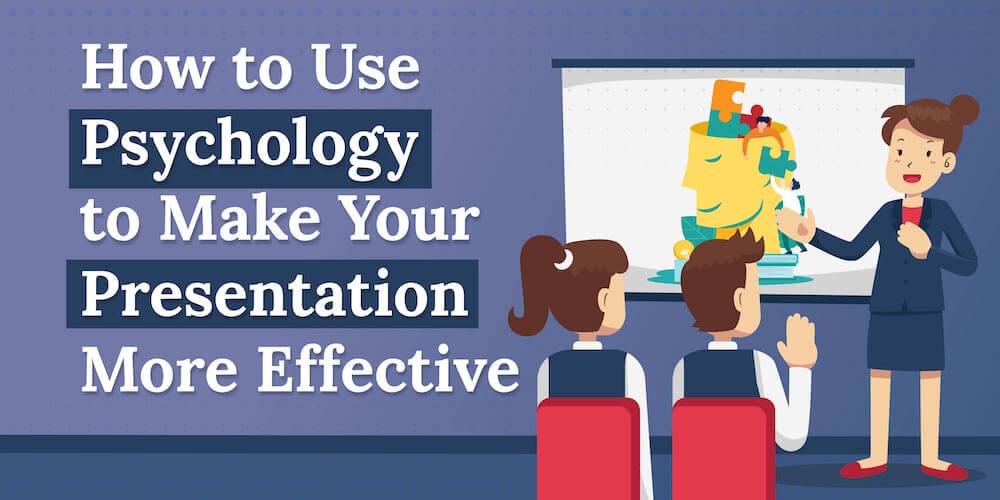
8 Effective Ways to Introduce Yourself in a Presentation
How to write a problem statement slide, how to write the perfect titles for your slides, pro tips to create an impactful employee induction presentation.
Why does anyone go through the work of delivering a presentation?
It is because they want to educate the audience about a certain thing and evoke some action out of it. The central purpose is to derive some form of result from your talk. Each one of us, at some point, has to deliver a presentation, whether academically or professionally.
What does it take to travel the distance from a good to a great presentation? How do you ensure what you have created will stay with people and generate the required response?
There is no one answer to it. Your content, communication skills, slide design, everything is a piece that needs to be put to complete the puzzle.
However, if you keep the principles of psychology in mind, you are much closer to hitting the right chords than otherwise. It will help you connect to your audience at a much deeper level and deliver your message with a full impact.
This article details tips on how to use the power of psychology to add more meaning and depth to your presentation and connect with your audience better.
Does Psychology Play a Role in Presentations?
100% it does. Our learning styles are different. Our attention pattern is different, which eventually translates into our memory. Presenters, who are mindful of this, stand a better chance of connecting with people more at an individualistic level.
Psychological Tips to Create an Impactful Presentation
Let’s see how you can use psychology to create an impactful presentation.
1. Take Care of the Learning Style
Let’s find out the 3 learning ways called the VAK model.
According to the model, people essentially are three kinds of learners –
- Visual learners – They learn better with visual content like bars, graphs, charts, mind maps, illustrations, etc. Appropriate body language, facial expressions, gestures, and other visual cues are effective while communicating.
- Auditory learners – They learn better through sounds and words. Voice modulation, pitch, tone, pauses, etc., can be used to emphasize points and spark curiosity.
- Kinesthetic learners – They learn better through experience. Touching, moving around, doing, sharing, activities, etc., can help them participate more.
Incorporating a mix of all is a decent approach to outreach diverse audiences. However, you can choose your combination depending on the people you are catering to.
2. Incorporate Elements/Cues that Help them Remember
You would want people to remember the important data or key takeaways from your presentation. In fact, you would want them to remember most parts of your presentation.
Does that happen in reality? Not often.
Incorporate elements in your presentation that help capture the attention of your audience.
The more you are able to catch their attention through means like captivating data, voice modulation, slide designs, etc., the more they will be able to retain the information better.
You can use the power of memory-building concepts like mnemonics, visual imagery, memory castle, etc., to help them remember the data/content/statistics better.
3. The Serial Position Effect
According to this principle, ideas that are presented initially stand the chance of being remembered better than concepts presented in the middle or end. Additionally, ideas presented at the end are remembered better than ideas presented in the middle.
What does it mean for your presentation?
Present your central idea in the beginning, expand upon it in the middle, and reiterate it in the end. It will help your audience recall the concept better.
However, you might have a few limitations to it –
- You might need a little time to build up to the central/main part of the presentation.
- Some people prefer anecdotes and other things to warm up to the audience and proceed slowly and softly.
Even if you rightly can’t present your main idea at the beginning, find innovative ways to introduce your point in a way that fits in the initial section of the presentation.
For example, your product solves a problem. So, in the initial part, you can tell the audience about the fact. This way, an introduction has been made right at the start for you to build on later.
4. The Von Restorff Effect
The principle states that the concepts which stand out from other similar ones are more likely to be remembered. It is a bias towards the unusual.
Now, what are the key points that you want people to remember?
After you have zeroed in on that, the next question would be how you can make those key points stand out.
Well, there are a lot of ways.
- One way you can highlight your point is through slide design. Differentiate the important slide from the others by going for a different design.
- You can also move from no slides to sharing slides only for the most important part. This way, people will be more attentive toward those sections.
- You can also alter your style of delivery for the important sections. Change your tone, pitch, interactive exercises, body language, delivery style, props, demonstrations, etc., to highlight important sections.
- Tweak colors, sizes, shapes, and other visual elements to spark curiosity.
Be mindful of people noticing the difference in your presentation style because if they don’t, you will miss the point of highlighting the relevant points.
5. Anecdotes and Storytelling
There is a documentary called The Nero’s Guests highlighting the agrarian crisis in India. To make the point, the documentary starts by drawing an intriguing parallel between the ruling class and the Roman emperor Nero and his guests. The storytelling draws a powerful parallel and hooks the audience into the narrative.
That’s what storytelling does. You can take your audience to some other time and help see how it connects to the problems and solutions of today.
What’s more?
Stories release chemicals in your body that help evoke feelings of connection and empathy and improve focus and attention. Use the power of storytelling to help people remember your information better and to forge instant connections with people.
6. Create a Powerful Headline
Going back to the example of the documentary Nero’s Guests, how do you think the title India’s agrarian crisis or Farmers in Distress would have felt compared to this?
A little flat, right?
Strong headlines will help you deliver your message more powerfully. It will help your audience connect to your content more. You can go for one-word, short phrases, or long headlines. We recommend going for worded titles over single words, as it enhances slide retention. You can also pair your headlines with catchy graphics to add to its appeal.
7. Your Content should have a Structure
Following a structure will help you present data in a coherent form. It will provide an outline to your content so that it doesn’t look illogical. Also, research says that people can retain structured information 40% easier than that delivered in a freeform manner. That’s because our brain processes things that are aligned. You can follow the following structures to provide clarity to your content –
- Chronology – It is best when you want people to walk through a process or for reporting.
- Comparison – Good when you want to show the differences and similarities, i.e., when highlighting the advantages of a specific approach to an issue.
- Cause and effect – Effective when you want to show the logic behind your position.
- Problem, solution, benefits – Effective for CTA when you want to motivate/persuade people to do something.
Also, don’t overload your presentation slides with content and information. People won’t be able to remember it all anyway, and your central point might get muffled with all the supporting data and information.
8. Break it up
According to research – people lose attention/focus after 10 minutes. You have your audience engaged, but your presentation is going to take, let’s say, around 20 minutes. What do you do? As it’s not possible every time to crunch material into a short presentation.
So, in that case, try to bring a change or contrast that sort of breaks your presentation and gives people a small break.
You can add something humorous, change the medium of transmission of information (slide to video), do something unexpected, give a small break, etc., to keep people engaged and lively.
9. Use Visuals to Spark Curiosity
We know that visuals aid in memory retention and also help provide an aesthetic appeal to something. Use creative visuals to spark curiosity and grab more attention. Here are a few tips that can help you use the power of visuals –
- Use bars, charts, diagrams, and graphs to present numbers/words over tables. People will be able to take out essential information quickly and more comfortably.
- According to a study, images with 7 or more colors are more memorable than images with 2-6 colors. So, go bold with colors when trying to showcase an important slide.
- Don’t go for complex visuals. According to research, our neural resources are limited. Complex visual information can reduce the brain’s capacity to process.
- There is a phenomenon called the curiosity gap. People are able to learn and retain better when they are curious about something. Try incomplete visuals, clickbait titles, missing data/information, etc., to spark curiosity in people and keep them focused throughout.
In a Nutshell
Psychology plays an important role in hitting the mark with your audience (since it is people you are presenting to).
Use elements to highlight important sections of your presentation, keep your presentation short, incorporate elements that help with memory retention, use the power of visuals and storytelling to create attractive content, and provide a concrete structure to your work. And don’t forget to provide small breaks in between to give people the space and time to digest the information (if your presentation is a little long).
Follow the tips, and you are good to go with a mind-boggling presentation.
More articles
9 types of presentations you should know (with examples), 10 tips to start your presentation impressively, the impact of stories in speeches and presentations, leave a reply cancel reply.
Save my name, email, and website in this browser for the next time I comment.
Latest Articles
Why is public speaking scary and how to overcome this fear , why does a presentation need good visuals.
© 2024 Collidu.com. All Rights Reserved.
Information
- Visit Our Store
- Free PowerPoint Templates
- Google Slides Themes
Popular Categories
- Presentation Ideas 51
- Public Speaking 22
- Presentation Design 12
- Business 10
- PowerPoint Tips 4
- Google Slides Tips 1
Editor Picks

- Search Search Search …
Free Templates for Psychology for PowerPoint and Google Slides
Make your presentations and lessons stand out with these free templates for Psychology .
Download them to use with PowerPoint or edit them in Google Slides and start creating!
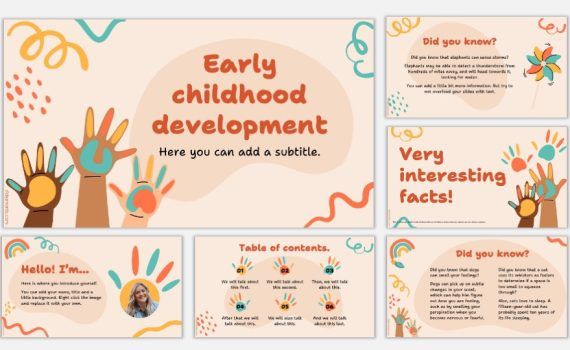
Captivate your audience and transform your presentation on early childhood development with this free template! Playful illustrations like children’s handprints, whimsical doodles, paper airplanes and windmills bring a touch of childlike wonder to your slides. This engaging template is the perfect backdrop to share your valuable insights on this crucial […]
Early Childhood free presentation template for Google Slides and PPT.

Green Minimal Boho free PowerPoint Template and Google Slides Theme This free PowerPoint template and Google Slides theme features a boho and minimal style with geometric and organic shapes along with a few leaves. As usual, even though I chose sage green and beige, you can edit the theme and […]
Green Minimal Boho free slides template.
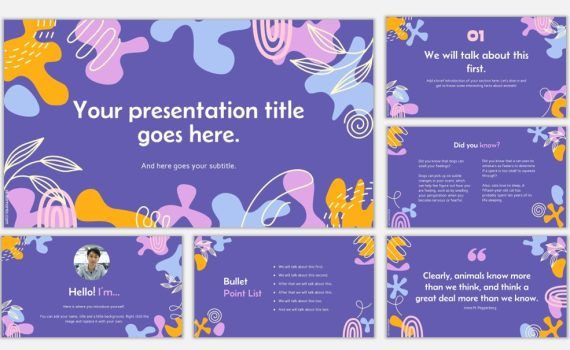
Cheerful colored wobbly shapes and lines free PowerPoint Template and Google Slides Theme If you need a cheerful template with abstract shapes, this theme is perfect for you. You can use it to talk about psychology, abstract thinking or even poetry. It comes with a certificate layout and I’ve used […]
Wobbly shapes and cheerful colors free slides theme.
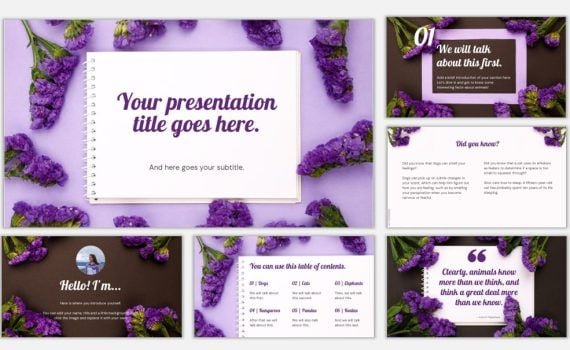
Free purple flowers photo background template for Google Slides and PowerPoint. This Google Slides template features beautiful images of a flat lay of purple wildflowers. The template includes a variety of slides with different layouts, so you can easily create a presentation that is both informative and visually appealing. You […]
Purple wildflowers photo background free template.

Free PowerPoint template and Google Slides theme. Template with a shadow overlay. Agnes is a beautiful inspirational slides theme. The shadow overlay gives it a unique touch and it can be easily adapted to different topics by simply changing the images of the plants, for pictures that represent your presentation […]
Agnes, elegant botanical theme.
Got any suggestions?
We want to hear from you! Send us a message and help improve Slidesgo
Top searches
Trending searches

62 templates

pink flowers
255 templates

63 templates

el salvador
34 templates
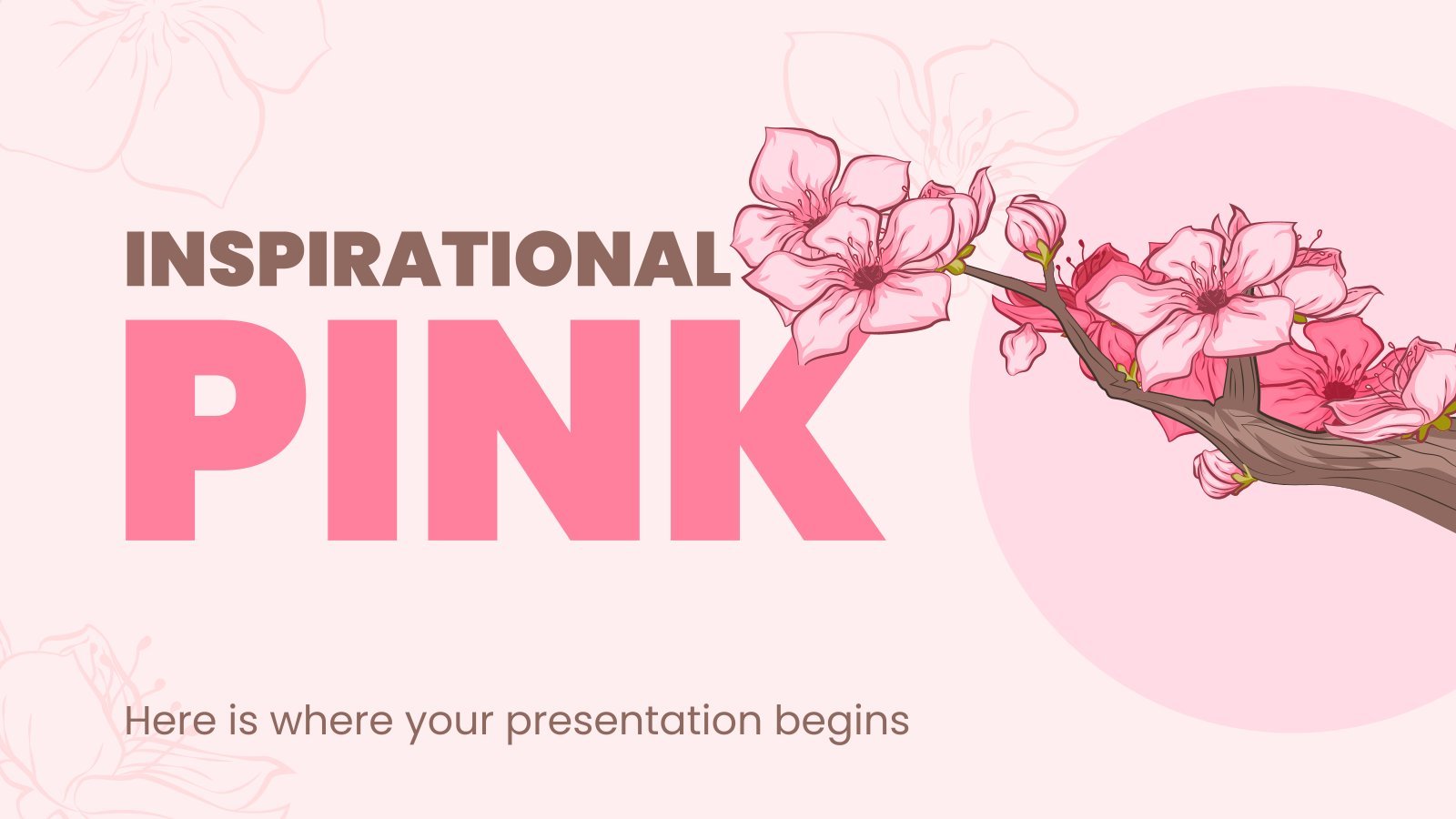
15 templates

16 templates
Positive Psychology
It seems that you like this template, positive psychology presentation, free google slides theme, powerpoint template, and canva presentation template.
What is positive psychology? Well, actually you would only have to download this template to find out the answer, but we are going to give you a little preview to make you want to discover how exciting it is. It's a branch of psychology that, in the words of the expert Slidesgo collaborated with to design this presentation, "focuses on what people have, not what they lack." Having a positive mindset helps in dealing with negative experiences. If you are interested in the topic or want to teach a class, here you have a design in different languages about positive psychology. Just download the template and that's it, the information is already written.
Features of this template
- Designed for teachers and parents
- 100% editable and easy to modify
- 18 different slides to impress your audience
- Contains easy-to-edit graphics such as graphs, maps, tables, timelines and mockups
- Includes 500+ icons and Flaticon’s extension for customizing your slides
- Designed to be used in Google Slides, Canva, and Microsoft PowerPoint
- 16:9 widescreen format suitable for all types of screens
- Includes information about fonts, colors, and credits of the resources used
- Available in different languages
How can I use the template?
Am I free to use the templates?
How to attribute?
Attribution required If you are a free user, you must attribute Slidesgo by keeping the slide where the credits appear. How to attribute?
Available in.

Register for free and start downloading now
Related posts on our blog.

How to Add, Duplicate, Move, Delete or Hide Slides in Google Slides

How to Change Layouts in PowerPoint

How to Change the Slide Size in Google Slides
Related presentations.

Premium template
Unlock this template and gain unlimited access
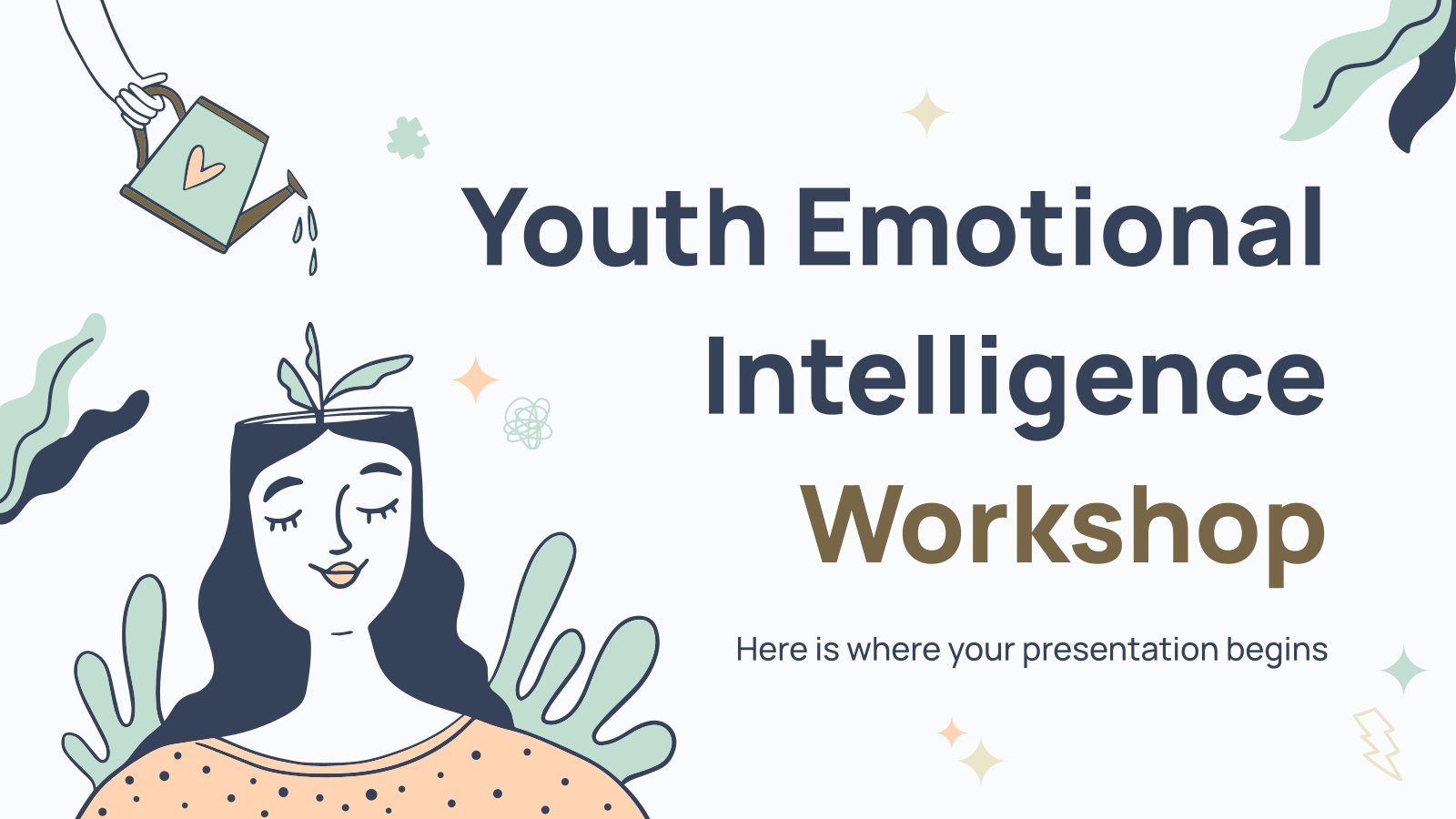
Create your presentation Create personalized presentation content
Writing tone, number of slides.

Register for free and start editing online
Like what you're reading?
Need a good presentation topic? Here are hundreds of them.
Get your team on prezi – watch this on demand video.
Anete Ezera November 04, 2022
If you’re looking for good topics for presentations, you’ve landed on the right page. In this article, you’ll find plenty of good presentation topics, tips on choosing the most suitable presentation topic for you, and essential design elements to make your presentation a success.
Many factors go into an excellent presentation. You need to have confident body language and engage your audience to hold their attention. You also need eye-catching visual aids like images, data visualizations, GIFs, and others (all of which you can find in Prezi ), not to mention a great opening to grab attention and a strong closing line to stay memorable. However, the most essential aspect of your presentation is the topic. It’s the core of your presentation, so it has to be strong, insightful, attention-grabbing, and appealing to yourself and your audience in order to evolve into a successful presentation everyone will love.

How to choose a good presentation topic
There are millions of topics you could create a presentation on, but what defines a good presentation topic? If you’re struggling to either come up with a good topic for a presentation or you can’t decide between multiple ones, here are a few questions you should ask yourself before choosing a topic.
What’s the goal of your presentation?
When you’re choosing a presentation topic, consider the meaning behind it. Ask yourself what the purpose of talking about this topic is, and what you want to say about it. Whatever topic you choose to present, the conclusion needs to provide a takeaway or lesson you want to communicate to your audience. A meaningful goal will make your presentation more memorable.
Are you interested in the topic?
If you’re not interested in the presentation topic, others won’t be curious either. Interest, enthusiasm, and passion enrich your presentation and are noticeable when presenting. Interest shines through and inspires others to find the topic as fascinating as you do. Think about the last time you saw someone sharing something they were passionate about – their excitement drew people in to pay closer attention to what they were saying.
When choosing a topic, you need to find it or a particular angle of it interesting for yourself. For example, perhaps you’re not a pop music enthusiast, but you’re passionate about studying cultural phenomena. In this case, you can talk about pop music’s influence on early 2000s youth culture.
Will your audience find this topic relatable?
While you have to find the topic you’re presenting interesting, you also have to think about your audience. When choosing a subject, consider your audience’s background in terms of demographics, interests, culture, and knowledge level about the topic. Think about what others will find fascinating and relevant, so they’re not bored or confused during your presentation.
Do you have prior experience or knowledge about this topic?
Personal experiences are always great to share in a presentation, providing your unique perspective for anyone listening. While you can easily prepare your presentation based on a quick Google search, it won’t make the same lasting impact on your audience. Choose a presentation topic you have some prior knowledge about, or have an interesting opinion you can share with others. It’ll make your presentation more engaging and memorable.

Ideas for good presentation topics
It’s not easy to come up with a good presentation topic from scratch. It’s much easier to get inspired from other good presentation topics to build your topic on. Whether you’re looking for presentation ideas for work, about me presentation ideas, unique or easy presentation topics, you’ll find them all here.
Without further ado, here are some good presentation topics to choose from or get inspired by.
Presentation topics about social media
- The role of social media in portraying gender stereotypes
- How social media impacts our body image
- How social media shaped Gen Z
- The most significant differences between the Facebook and TikTok generations
- The negative effects of social media
- The positive impacts of social media
- The effects of social media on behavior
- How social media impacts our physical (or mental) health
- How social media has shaped our understanding of mass media
- Should we teach about social media in schools?
- The rise of social media influencers
- How AR Instagram filters impact our self-image
- How to go viral on social media?
- The origins of social media echo chambers
- Social media as a news outlet
Author: Ish Verduzco
Presentation topics about movies
- How movies influence our understanding of good and evil
- Beauty standards represented in movies
- How female characters are depicted in Hollywood movies
- How horror movies and global fears have developed through time
- The adverse effects of romance movies
- How movies have changed our understanding of the Western culture
- Charlie Chaplin and the silent movie era
- The globalization of culture: Hollywood vs. Bollywood
- The psychology behind the music in films
- The ethics of using animals in movies
- Social media’s influence on the film industry
- The history of filmmaking
- The role of color in movies
- The cultural impact of romance movies
- How are gender stereotypes depicted in Hollywood movies?
Author: Cinto Marti
Presentation topics about music
- The impact of pop music on beauty standards
- Should digital music be free for everyone?
- The psychology behind the music in advertisements
- The effectiveness of sound therapy
- Can music inspire criminal behavior?
- The psychological effects of metal music
- The origins of K-pop
- How does music influence our understanding of the world?
- Can music help in the learning process?
- The positive effects of classical music
- The history of hip hop
- Why is music education essential in schools?
- The psychological benefits of playing piano
- Can anyone become a famous musician?
- The role of music in fashion
Author: Prezi Editorial
Presentation topics about health
- The link between food and mental health
- Inequality in the healthcare system
- Myths about healthy practices
- Simple practices that help you stay healthy
- Health education in schools: Should it change?
- Toxic positivity and mental health
- The impact of superfoods on our health
- The psychology behind unhealthy eating habits
- Sex education in schools: Why should we have it?
- How to trick yourself into getting better: The placebo effect
- How to strengthen your immune system
- How to tell if someone is depressed
- The health benefits of regular exercise
- The impact of junk food on mental health
- Stress-caused diseases
Author: Prezi Education Team
Presentation topics about human psychology
- What is social depression?
- What triggers panic attacks?
- The impact of testosterone on aggressive behavior
- How to overcome social anxiety
- Differences in the functioning of the brain of a child and adult
- The impact of violent video games on children’s brain development
- How does the use of social media influence our attention span?
- How to overcome childhood trauma
- The influence of marijuana on the human brain
- How does behavioral therapy work
- The psychology behind fame
- The causes of personality disorders
- The differences in brain functioning between men and women
- What happens in therapy sessions?
- The psychology of substance abuse
Presentation topics about self-development
- The impact of exercise on productivity
- How to deal with stress
- How to deal with procrastination
- The positive effects of meditation
- Why new–year’s resolutions don’t work
- How to overcome bad habits
- The impact of negative thoughts
- The negative effects of self-criticism
- The role of creativity in self-development
- Benefits of journaling
- How to learn something fast
- How to be mindful
- The importance of curiosity
- How to become more self-aware
- Why it’s essential to spend time with yourself
Author: Nir Eyal
Presentation topics about education
- What are the advantages and disadvantages of online education?
- The positive effects of a gap year
- Should university education be free?
- Inequality in education access
- How language learning benefits brain development
- Emerging gender issues in education
- The importance of socialization in school
- School bullying and student development
- The benefits of reading
- Is the education system broken?
- What you don’t learn in college
- The link between education and brain development
- The history of schools
- The gender gap in STEM
- The connection between equality in education and economic growth
Presentation topics about culture
- Is graffiti a form of art or street vandalism?
- Cultural diversity in the workplace
- The impact of culture on gender roles
- The issue with orientalism
- Are humans the only species that has culture?
- How do different cultures view death?
- The ethical issues of pop culture
- The impact of culture on personal development
- Sexism in different cultures
- The impact of globalization on local cultures
- The viral spread of the #metoo movement
- The history of subcultures
- The problem with romanticizing toxic relationships in movies
- 90s pop-culture influence on fashion trends
- The evolution of cultural psychology
Author: Devin Banerjee
Presentation ideas for work
- What it’s like to be a digital nomad?
- How to deal with workplace conflicts
- The secret to a productive day
- How to set achievable goals
- The importance of diversity in a workplace
- The positive effects of creative thinking at work
- How to give constructive feedback
- The characteristics of a valuable team member
- Inequality and the glass ceiling
- Racial discrimination in the workplace
- Work habits of different cultures
- How is work perceived in various countries?
- Technological development and the future of work
- The importance of a healthy work/life balance
- The rise of health problems in office work
Author: Charles Huang
Presentation topics about hybrid work
- The positive effects of hybrid work on work/life balance
- Is hybrid work the future work model?
- How to stay connected in a hybrid work model
- The challenges of hybrid work nobody talks about
- How to stay productive when working from home
- The social effects of hybrid work
- The economic impacts of hybrid work
- Case study: Hybrid work model in [company]
- What causes Zoom fatigue?
- The problem with online meetings
- Is hybrid work better than remote work?
- How to develop a close relationship with colleagues in a hybrid work model
- What kind of company culture is best for a hybrid work model?
- Is hybrid work sustainable?
- Cybersecurity consideration for hybrid working
Author: Barbie Brewer
Presentation topics about public speaking
- The importance of body language in public speeches
- How to appear confident when you’re not
- How to become a better orator
- The use of eye contact in public speaking
- Breathing exercises that will calm you down before public speaking
- The benefits of public speaking
- Ways to improve public speaking skills
- How to leave a great first impression on stage
- How to engage your audience during a public speech
- How to best structure your public speech
- How to end your presentation speech
- Can anyone learn to be good at public speaking?
- How to prepare for a public speech
- What not to do right before a public speech
- How to address a controversial topic in a public speech
Author: Prezi Team
Presentation topics about entrepreneurship and leadership
- The main principles of a good leader
- The impact of leadership skills on professional performance
- The mistake every entrepreneur makes
- How to successfully lead a cross-cultural team
- How to celebrate inclusivity in a diverse team
- What are the common personality traits of a successful entrepreneur?
- The impact of entrepreneurship on the global economy
- The characteristics of a leader
- The most common challenges of entrepreneurship
- Can anyone learn to become a successful leader?
- What affects new venture growth?
- The psychology of leadership
- What is crowdsourcing?
- The benefits of being an entrepreneur
- Common mistakes leaders make
Author: Jill Sinclair

Presentation topics about technology
- The rise of technological development
- Is technology addictive?
- Should we use drones for military and non-military purposes?
- The sustainability of electric cars
- What are deepfakes?
- Limitations of AI machines
- The future of programming
- Ethical issues of AI
- The future of AR in business
- How VR can be used in the medical field
Author: David Vandegrift
Sales presentation topics
- How to make a cold email intro
- What is sales enablement?
- How to build better relationships with customers
- The best way to improve pipeline management
- Coaching via verbal and written role-play
- How to plan cold calls
- What’s a deal-breaker for most customers?
- All about personalized coaching
- How to manage objections
- How to close more deals
- How to keep your prospects engaged
- Effective sales communication strategies
- How to conduct a competitor analysis
- The most valuable sales skills
- What soft skills do you need to become a successful sales rep?
Author: Cindy McGovern
Easy presentation topics
- Benefits of daily exercise and how to incorporate it into your routine
- Simple and nutritious meal recipes
- Tips for improving time management and productivity
- The importance of recycling
- The history of a local landmark or festival
- Ways to reduce stress
- Exploring different types of renewable energy sources and their impact on the environment
- The basics of budgeting and saving money for future goals
- The benefits of social media for professional use
- Tips for overcoming stage fright
- How to start a meditation practice
- The impact of technology on modern society
- The basics of personal finance
- The health benefits of a plant-based diet
- The history of Earth Day
Good how to presentation topics
- How to create a successful social media marketing strategy
- How to give a persuasive presentation
- How to create effective and engaging content for your blog
- How to discover your strengths and weaknesses
- How to use project management tools to increase productivity
- How to make the most out of boring meetings
- How to build a personal brand
- How to conduct effective market research
- How to use data analytics to improve decision-making
- How to improve your decision-making process
- How to write a winning proposal
- How to create a visually stunning presentation
- How to manage stressful situations at work
- How to make friends as an adult
- How to network at work events
About me presentation ideas
- My journey to becoming who I am today
- My passion for [insert topic or activity]
- My career aspirations and goals
- My travels and adventures around the world
- My hobbies and interests outside of work/school
- My role models and influences
- My strengths and weaknesses
- My favorite books, movies, and TV shows
- My proudest achievements and accomplishments
- My favorite childhood memories
- My family and friends
- My education and academic background
- My volunteer and community service experience
- My personality traits and values
- My vision for the future and how I plan to achieve it
Author: Adam Grant
Student presentation ideas
- The history and evolution of video games
- The history and cultural impact of tattoos
- The impact of social media on body image and self-esteem
- The effects of globalization on local cultures and economies
- The role of education in promoting social justice and equity
- The ethical implications of autonomous weapons in warfare
- The impact of mass media on society and culture
- The causes and effects of deforestation on biodiversity and climate change
- The history and cultural significance of dance in different parts of the world
- The psychology of addiction and recovery
- The impact of the gig economy on labor rights and job security
- The history and impact of feminism on gender equality
- The benefits and drawbacks of renewable energy sources
- The impact of colonialism on indigenous cultures and identities
- The role of technology in promoting global connectivity and intercultural understanding
Author: Edward Quinn
Informative presentation topics
- The science of sleep: How to get a restful night and improve your wellbeing
- A journey through the history of the internet
- Exploring the potential of AI in our world
- Climate change: Understanding the challenge, seeking solutions for a sustainable future
- How new technologies are shaping the future of food
- Understanding the psychology of money for financial success
- The power of a story: How storytelling captures hearts and minds
- Mastering the art of negotiation in every interaction
- The science of happiness: Unlocking the secrets to a more fulfilling life
- The power of mindfulness for a more present and peaceful YOU
- Understanding cybersecurity threats and protecting yourself online
- Exploring the potential of virtual reality for a more immersive future
Author: Andrew Davis
How to create a good presentation
If you know what you want to present on, it’s time to create an impactful presentation that grabs everyone’s attention. Presentation design plays a crucial role in how your presentation is received and remembered. To stand out and leave a memorable impact on your audience, create a Prezi presentation. Instead of a linear, slide-based presentation, offer an engaging and dynamic storytelling experience to your audience. Breathe life into your presentation with motion, zoom, and spatial relationships. When creating your presentation, consider the following three essential elements:
Visuals play a significant part in presentation design. They evoke emotions, make a memorable impact, and give more context to the story. Not to mention, 65% of people are visual learners , so visual aids are helpful when explaining a complex topic.
In your presentation, include different types of visuals, such as images, videos, GIFs, and stickers, all of which you can find in Prezi’s content library. When selecting your visuals, consider what’s relevant and brings additional value to the story. Only add what’s meaningful and necessary. A video or image at the right place and time will enrich the viewing experience and make your presentation more memorable.
The layout of your presentation is the structure of your story. It’ll help you introduce the topic, intrigue your audience, and unfold the layers of your topic one by one until you disclose your main arguments and summarize the presentation. A good presentation layout has a hierarchical, chronological, or logical flow that leads the viewer from start to finish.
If you’re creating a Prezi presentation, you can create a dynamic storytelling experience by experimenting with your layout. Instead of going from slide to slide, you can zoom in and out of topics and experiment with different shapes, animations, and effects that draw the viewer into your story world. Here’s an example of a Prezi presentation with a great storytelling layout:
Author: Lydia Antonatos
Data visualizations can elevate your presentation from being a good one to a great one. By providing data behind your arguments, you’ll appear more trustworthy and confident in your audience’s eyes.
Add charts, graphs, interactive maps, and more to your presentations with Prezi Design. You can choose from a wide selection of charts and maps to illustrate your data. With interactive elements, you’ll be able to engage your audience and make a memorable impact.
Engaging visuals, a well-structured layout, and relevant data visualizations will provide a great starting base to create a memorable presentation. Discover other tips and tricks that make your presentation effective and capture people’s attention.
Prezi AI for presentation success
If you already have a clear presentation style in mind or plenty of time for creation, fantastic! But what if you only have a day or less or you don’t know where to start? Enter Prezi AI . It’s your assistant for streamlining the presentation creation process. Here’s how Prezi AI leverages the power of artificial intelligence to turn you into a presentation pro:
Effortless design from scratch
Ditch the blank page anxiety with the AI presentation maker . Simply provide a title or outline, and Prezi AI will generate a visually appealing draft presentation in seconds. It’s like having a built-in design assistant ready to brainstorm with you.
Smarter text, stronger impact
Prezi’s AI text-editing tool helps you perfect your message in seconds. It analyzes your content, suggesting improvements for readability and conciseness.
From bullet points to animations
Let’s face it, static bullet points can put even the most dynamic presenter to sleep. Prezi’s AI animated slides maker transforms your text into captivating visual stories. Choose from formats like flowcharts, animated lists, or zoom reveals to keep your audience engaged.
Perfect for busy presenters
We all know the struggle – a million tasks on your plate, and a looming presentation deadline. Prezi AI can help you save valuable time! With AI assistance, you can generate presentations faster, focus on refining your content, and present with the confidence that comes from knowing your presentation looks polished and professional.
Design help
Don’t worry if you don’t have an eye for design. Prezi AI provides the tools and guidance to create presentations that impress visually.
With Prezi AI, crafting presentations is easy, allowing you to focus on delivering your message with impact and leaving your audience engaged and inspired. Explore what’s possible with Prezi A I today!
Learn more on how to turn your presentation topic into a stunning presentation with AI:
Final thoughts on selecting good presentation topics
Choosing a topic for a presentation isn’t easy. When selecting a topic, think about the goal of your presentation, your interests, and knowledge about the topic, and whether or not your audience will find it relevant and interesting for them. Also, get inspired by other topics that’ll help you figure out what you want to talk about. Lastly, when creating your presentation, consider the impact of visuals, layout, and data visualizations. To simplify the creation process, try Prezi AI or follow the step-by-step process of making a presentation with helpful tips and resources.

Give your team the tools they need to engage
Like what you’re reading join the mailing list..
- Prezi for Teams
- Top Presentations

Psychology Presentation Template
Create an attractive and in-depth presentation using our psychology creative presentation template!
- Design style modern
- Colors vibrant
- Size Custom (1024 x 576 px)
- File type PNG, PDF, PowerPoint
Delivering a psychology presentation that will keep your audience interested just got a lot easier with Venngage’s Psychology Creative Presentation! Whether you’re discussing mental disorders or depression, the Psychology Creative Presentation template is just what you need to give an informative discussion. You can customize this template by changing the colors and background design of each slide, add maps, charts, tables, or graphs for statistics or to compare facts. The Psychology Creative Presentation can also be edited with text, bullet points, font, icons, images and you can upload photos. Don’t wait to customize the Psychology Creative Presentation so you can have a presentation that will impact your audience!
Explore more
Related presentations.


200 Positive Psychology Topics

These topics cover various aspects of positive psychology, including happiness, resilience, and personal growth, providing valuable insights for students, professionals, and anyone keen on exploring the science of a fulfilling life.
- The Science of Happiness: Understanding Its Foundations
- Gratitude and Well-Being: What’s the Connection?
- Mindfulness Practices and Their Impact on Mental Health
- The Psychology of Optimism: How It Can Improve Life
- Flow Experiences and Peak Performance in Athletes
- Emotional Intelligence and Success: Analyzing the Link
- The Power of Positive Thinking in Stress Management
- Resilience: Building Strength From Adversity
- Developing Self-Compassion for Personal Growth
- Character Strengths and Virtues: A Psychological Exploration
- The Role of Hope in Overcoming Life’s Challenges
- Savoring Life’s Pleasures: Techniques and Benefits
- Positive Relationships: The Key to a Fulfilled Life
- The Effects of Altruism on Mental Health
- How Does Forgiveness Contribute to Emotional Healing?
- Empathy and Its Importance in Human Connection
- A Study of Well-Being in Different Cultures
- Love and Psychology: How It Affects Our Minds
- Mind-Body Connection: Psychological Influences on Physical Health
- The Application of Positive Psychology in the Workplace
- The Impact of Nature and Green Spaces on Mental Health
- How to Practice and Benefit From Positive Affirmations
- The Psychology Behind Laughter and Humor
- Self-Efficacy and Achieving Personal Goals
- Exploring the Concept of a ‘Good Life’
- The Influence of Music on Emotional Well-Being
- Positive Education: Fostering Well-Being in Schools
- Visualization Techniques for Success and Happiness
- The Benefits of a Positive Attitude in Healthcare
- The Significance of Creativity in Enhancing Life Satisfaction
- Positive Aging: Strategies for Maintaining Happiness in Later Life
- The Influence of Spirituality on Positive Mental Health
- The Importance of Play and Relaxation in Adult Life
- The Role of Positive Interventions in Clinical Psychology
- The Link Between Physical Exercise and Psychological Well-Being
- Achieving Work-Life Balance for a Better Quality of Life
- Positive Parenting Techniques for Raising Happy Children
- Self-Regulation Skills and Their Impact on Individual Progress
- The Psychology of Goal Setting and Personal Fulfillment
- How Cultural Beliefs Shape Positive Psychological Practices
- Contribution of Volunteer Work to Personal Development
- The Impact of a Growth Mindset on Learning and Development
- How Pets Contribute to Human Mental Health and Happiness
- Mindful Eating: The Psychological Benefits of a Conscious Diet
- Understanding and Applying the Perma Model for Well-Being
- Mentorship and Its Effects on Positive Personal Development
- Overcoming Limiting Beliefs for Personal Empowerment
- The Role of Assertiveness in Achieving Life Satisfaction
- Strength-Based Approaches in Counseling and Therapy
- The Relationship Between Social Media Use and Happiness
- Enhancing Life Through Positive Communication Skills
- Harnessing Optimism to Cope With Chronic Illness
- Using Positive Psychology to Build Effective Teams
- The Effects of Body Language on Self-Confidence
- Using Humor as a Coping Mechanism in Difficult Times
- The Psychology of Personal Branding and Self-Promotion
- Positive Psychological Perspectives on Aging
- The Benefits of Random Acts of Kindness
- Strategies for Maintaining Energy and Avoiding Burnout
- The Psychological Effects of Gratitude Journaling
- The Role of Life Coaching in Personal Development
- Positive Psychology and Its Implications for Leadership
- The Importance of Adaptability in the Face of Change
- The Concept of Subjective Well-Being and Its Determinants
- Psychological Techniques for Enhancing Personal Resilience
- How Personal Values Shape Our Happiness
- The Role of Community Involvement in Individual Well-Being
- Post-traumatic Growth: Emerging Stronger From Adversity
- The Pursuit of Happiness in Philosophy and Psychology
- Positive Psychology for Overcoming Procrastination
- The Intersection of Positive Psychology and Ecotherapy
- Self-Acceptance: The Key to Inner Peace and Satisfaction
- Enhancing Psychological Flexibility for a Better Life
- Benefits of Implementing Daily Positive Psychology Exercises
- Understanding the Impact of Social Support on Mental Health
- Cultivating a Sense of Meaning and Purpose in Life
- The Role of Forgiveness in Interpersonal Relations
- The Psychology of Generosity and Its Effects on the Giver
- The Potential of Positive Youth Development
- The Application of Positive Psychology in Addiction Recovery
- How Lifestyle Choices Influence Psychological Well-Being
- Strategies for Fostering Optimism in Children
- The Psychological Effects of Engaging With Art and Culture
- Developing a Healthy Relationship With Technology for Well-Being
- The Influence of Social Comparisons on Self-Esteem
- The Science Behind Smiles and Their Effect on Mood
- Positive Psychology in Sports Coaching for Enhanced Performance
- How Positive Psychology Principles Can Improve Educational Outcomes
- The Impact of Social Entrepreneurship on Community Well-Being
- Emotional Resilience: The Key to Bouncing Back
- Exploring the Use of Narrative Therapy in Positive Psychology
- The Role of Inner Dialogue in Shaping Happiness
- Positive Psychology Techniques to Enhance Creative Thinking
- The Relationship Between Job Satisfaction and Overall Well-Being
- Finding Joy and Fulfillment in Simple Daily Activities
- Using Positive Psychology to Cope With Infertility and Loss
- The Concept of Peak Experiences and Their Influence on Individuals
- The Power of Gratitude in Relationships
- The Importance of Maintaining a Positive Self-Image
- Strategies for Positive Conflict Resolution
- Examining the Impact of Positive Psychology in Multicultural Contexts
- The Psychological Benefits of Travel and New Experiences
- Coping With Anxiety Through Positive Thinking Strategies
- Techniques for Increasing Kindness and Compassion in Society
- How Self-Discipline Contributes to a Sense of Achievement
- The Power of Narrative in Shaping a Positive Identity
- The Effect of Positive Psychology on Academic Performance
- How a Sense of Humor Can Enhance Life and Relationships
- Cultivating Patience: A Positive Psychological Approach
- The Benefits of Being Present: The Psychology of Savoring the Moment
- How to Cultivate Positive Emotions in Everyday Life
- The Role of Personal Autonomy in Satisfaction and Well-Being
- Setting and Pursuing Personal Aspirations for a Fulfilling Life
- Positive Psychology for Managing and Reducing Stress
- Exploring the Concept of Eudaimonic Well-Being
- The Effects of Peer Pressure on Adolescent Well-Being
- Positive Psychology Interventions for Chronic Pain Management
- Fostering Leadership Skills Through a Positive Psychology Lens
- The Impact of a Supportive Environment on Personal Growth
- Positive Psychology in the Digital Age: Opportunities and Challenges
- Strategies for Enhancing Social Intelligence
- The Psychological Benefits of Maintaining a Healthy Lifestyle
- Positive Psychology in Romantic Relationships
- The Concept of Authentic Happiness and How to Achieve It
- Understanding and Managing the Psychological Impact of Social Isolation
- Overcoming Negativity Bias Through Mindful Practices
- The Role of Curiosity in Personal Development and Learning
- Positive Psychology Strategies for Effective Time Management
- Cultivating a Sense of Belonging for Improved Mental Health
- Positive Interventions for Building Self-Esteem in Youth
- The Dynamics of Happiness in Family Life
- Strengthening Community Bonds Through Positive Initiatives
- The Benefits of Living With Intention and Awareness
- Creative Expression as a Form of Positive Psychology
- How to Create a Positive Organizational Culture
- The Relationship Between Physical Activity and Positive Mood
- How to Foster Innovation Through Positive Thinking
- The Psychological Benefits of Maintaining Traditions and Rituals
- Understanding and Applying the Concept of Self-Transcendence
- Positive Psychology for Coping With Life Transitions and Change
- The Role of Positive Emotions in Overcoming Depression
- Building Emotional Literacy for Better Interpersonal Connections
- The Impact of Humor Therapy on Health and Well-Being
- How to Achieve Work Fulfillment and Prevent Job Burnout
- The Influence of Personality Traits on Happiness
- Positive Psychology Approaches to Eating Disorders
- The Role of Compassion in Healthcare Settings
- Strategies for Positive Communication in the Digital World
- Enhancing Academic Motivation Through Positive Psychology Principles
- How to Use Strength Identification for Personal Empowerment
- The Relationship Between Volunteering and Life Satisfaction
- Positive Psychology Approaches to Grief and Loss
- Mindfulness Meditation for Reducing Anxiety and Promoting Calmness
- The Role of Mentoring in Fostering Youth Development
- How to Build a Positive Body Image Through Self-Compassion
- The Contribution of Leisure Activities to Overall Well-Being
- Cognitive Restructuring Techniques for a Positive Mindset
- Building Positive Habits for a Healthier Lifestyle
- The Impact of Positive Reinforcement on Behavior Modification
- The Psychology of Kindness and Its Ripple Effects
- How to Encourage Pro-social Behavior in Communities
- Strategies for Cultivating Emotional Stability
- The Impact of Social Media on Self-Worth and Positivity
- Positive Psychological Practices for Overcoming Addiction
- How to Achieve Balance Through a Holistic Lifestyle Approach
- The Benefits of Social Connection and Community Service
- Encouraging Positive Risk-Taking for Personal Growth
- The Art of Appreciative Inquiry in Personal and Professional Development
- Positive Strategies for Dealing with Workplace Conflict
- Understanding the Link Between Environment and Human Well-Being
- The Role of Resilience in Entrepreneurship
- Positive Mentality and Its Influence on Learning New Skills
- Fostering a Culture of Gratitude in Organizations
- Aligning Personal Values With Actions for Authentic Living
- Boosting Mood Through Exercise and Physical Activity
- The Psychology of Gifting and Its Effects on Relationships
- The Importance of Assertiveness in Personal Boundary Setting
- The Transformative Power of Positive Relationships
- Implementing Self-Care Routines for Sustained Well-Being
- Applying Positive Psychology to Enhance Artistic Performance
- The Influence of Early Childhood Experiences on Adult Happiness
- Positive Psychology and the Journey of Self-Discovery
- The Benefits of Cooperative Learning Environments
- Strategies for Overcoming Impostor Syndrome With Positive Psychology
- Building Self-Worth Through Achievement and Recognition
- Enhancing Life Satisfaction Through Community Engagement
- The Concept of Psychological Capital and Its Role in Personal Success
- Positive Psychology in Rehabilitation and Recovery Processes
- Enhancing Empathy Through Self-Reflection and Relationship Building
- The Psychology of Personal Change and Transformation
- Positive Technology: Harnessing Digital Tools for Well-Being
- Using Positive Psychology to Navigate Career Changes Successfully
- Encouraging Creativity and Innovation Through Positive Reinforcement
- The Role of Mindfulness in Academic Settings
- Strategies for Enhancing Intentional Living for Greater Fulfillment
- Applying the Principles of Positive Psychology to Stress Reduction
- The Importance of Laughter Yoga in Mental Health
- Building a Strength-Based Society for Greater Well-Being
- The Impact of Gratitude on Physical Health
- Positive Psychology and Its Role in Managing Environmental Stressors
Related Posts:

- Bipolar Disorder
- Therapy Center
- When To See a Therapist
- Types of Therapy
- Best Online Therapy
- Best Couples Therapy
- Managing Stress
- Sleep and Dreaming
- Understanding Emotions
- Self-Improvement
- Healthy Relationships
- Student Resources
- Personality Types
- Sweepstakes
- Guided Meditations
- Verywell Mind Insights
- 2024 Verywell Mind 25
- Mental Health in the Classroom
- Editorial Process
- Meet Our Review Board
- Crisis Support
50+ Research Topics for Psychology Papers
How to Find Psychology Research Topics for Your Student Paper
- Specific Branches of Psychology
- Topics Involving a Disorder or Type of Therapy
- Human Cognition
- Human Development
- Critique of Publications
- Famous Experiments
- Historical Figures
- Specific Careers
- Case Studies
- Literature Reviews
- Your Own Study/Experiment
Are you searching for a great topic for your psychology paper ? Sometimes it seems like coming up with topics of psychology research is more challenging than the actual research and writing. Fortunately, there are plenty of great places to find inspiration and the following list contains just a few ideas to help get you started.
Finding a solid topic is one of the most important steps when writing any type of paper. It can be particularly important when you are writing a psychology research paper or essay. Psychology is such a broad topic, so you want to find a topic that allows you to adequately cover the subject without becoming overwhelmed with information.
I can always tell when a student really cares about the topic they chose; it comes through in the writing. My advice is to choose a topic that genuinely interests you, so you’ll be more motivated to do thorough research.
In some cases, such as in a general psychology class, you might have the option to select any topic from within psychology's broad reach. Other instances, such as in an abnormal psychology course, might require you to write your paper on a specific subject such as a psychological disorder.
As you begin your search for a topic for your psychology paper, it is first important to consider the guidelines established by your instructor.
Research Topics Within Specific Branches of Psychology
The key to selecting a good topic for your psychology paper is to select something that is narrow enough to allow you to really focus on the subject, but not so narrow that it is difficult to find sources or information to write about.
One approach is to narrow your focus down to a subject within a specific branch of psychology. For example, you might start by deciding that you want to write a paper on some sort of social psychology topic. Next, you might narrow your focus down to how persuasion can be used to influence behavior .
Other social psychology topics you might consider include:
- Prejudice and discrimination (i.e., homophobia, sexism, racism)
- Social cognition
- Person perception
- Social control and cults
- Persuasion, propaganda, and marketing
- Attraction, romance, and love
- Nonverbal communication
- Prosocial behavior
Psychology Research Topics Involving a Disorder or Type of Therapy
Exploring a psychological disorder or a specific treatment modality can also be a good topic for a psychology paper. Some potential abnormal psychology topics include specific psychological disorders or particular treatment modalities, including:
- Eating disorders
- Borderline personality disorder
- Seasonal affective disorder
- Schizophrenia
- Antisocial personality disorder
- Profile a type of therapy (i.e., cognitive-behavioral therapy, group therapy, psychoanalytic therapy)
Topics of Psychology Research Related to Human Cognition
Some of the possible topics you might explore in this area include thinking, language, intelligence, and decision-making. Other ideas might include:
- False memories
- Speech disorders
- Problem-solving
Topics of Psychology Research Related to Human Development
In this area, you might opt to focus on issues pertinent to early childhood such as language development, social learning, or childhood attachment or you might instead opt to concentrate on issues that affect older adults such as dementia or Alzheimer's disease.
Some other topics you might consider include:
- Language acquisition
- Media violence and children
- Learning disabilities
- Gender roles
- Child abuse
- Prenatal development
- Parenting styles
- Aspects of the aging process
Do a Critique of Publications Involving Psychology Research Topics
One option is to consider writing a critique paper of a published psychology book or academic journal article. For example, you might write a critical analysis of Sigmund Freud's Interpretation of Dreams or you might evaluate a more recent book such as Philip Zimbardo's The Lucifer Effect: Understanding How Good People Turn Evil .
Professional and academic journals are also great places to find materials for a critique paper. Browse through the collection at your university library to find titles devoted to the subject that you are most interested in, then look through recent articles until you find one that grabs your attention.
Topics of Psychology Research Related to Famous Experiments
There have been many fascinating and groundbreaking experiments throughout the history of psychology, providing ample material for students looking for an interesting term paper topic. In your paper, you might choose to summarize the experiment, analyze the ethics of the research, or evaluate the implications of the study. Possible experiments that you might consider include:
- The Milgram Obedience Experiment
- The Stanford Prison Experiment
- The Little Albert Experiment
- Pavlov's Conditioning Experiments
- The Asch Conformity Experiment
- Harlow's Rhesus Monkey Experiments
Topics of Psychology Research About Historical Figures
One of the simplest ways to find a great topic is to choose an interesting person in the history of psychology and write a paper about them. Your paper might focus on many different elements of the individual's life, such as their biography, professional history, theories, or influence on psychology.
While this type of paper may be historical in nature, there is no need for this assignment to be dry or boring. Psychology is full of fascinating figures rife with intriguing stories and anecdotes. Consider such famous individuals as Sigmund Freud, B.F. Skinner, Harry Harlow, or one of the many other eminent psychologists .
Psychology Research Topics About a Specific Career
Another possible topic, depending on the course in which you are enrolled, is to write about specific career paths within the field of psychology . This type of paper is especially appropriate if you are exploring different subtopics or considering which area interests you the most.
In your paper, you might opt to explore the typical duties of a psychologist, how much people working in these fields typically earn, and the different employment options that are available.
Topics of Psychology Research Involving Case Studies
One potentially interesting idea is to write a psychology case study of a particular individual or group of people. In this type of paper, you will provide an in-depth analysis of your subject, including a thorough biography.
Generally, you will also assess the person, often using a major psychological theory such as Piaget's stages of cognitive development or Erikson's eight-stage theory of human development . It is also important to note that your paper doesn't necessarily have to be about someone you know personally.
In fact, many professors encourage students to write case studies on historical figures or fictional characters from books, television programs, or films.
Psychology Research Topics Involving Literature Reviews
Another possibility that would work well for a number of psychology courses is to do a literature review of a specific topic within psychology. A literature review involves finding a variety of sources on a particular subject, then summarizing and reporting on what these sources have to say about the topic.
Literature reviews are generally found in the introduction of journal articles and other psychology papers , but this type of analysis also works well for a full-scale psychology term paper.
Topics of Psychology Research Based on Your Own Study or Experiment
Many psychology courses require students to design an actual psychological study or perform some type of experiment. In some cases, students simply devise the study and then imagine the possible results that might occur. In other situations, you may actually have the opportunity to collect data, analyze your findings, and write up your results.
Finding a topic for your study can be difficult, but there are plenty of great ways to come up with intriguing ideas. Start by considering your own interests as well as subjects you have studied in the past.
Online sources, newspaper articles, books , journal articles, and even your own class textbook are all great places to start searching for topics for your experiments and psychology term papers. Before you begin, learn more about how to conduct a psychology experiment .
What This Means For You
After looking at this brief list of possible topics for psychology papers, it is easy to see that psychology is a very broad and diverse subject. While this variety makes it possible to find a topic that really catches your interest, it can sometimes make it very difficult for some students to select a good topic.
If you are still stumped by your assignment, ask your instructor for suggestions and consider a few from this list for inspiration.
- Hockenbury, SE & Nolan, SA. Psychology. New York: Worth Publishers; 2014.
- Santrock, JW. A Topical Approach to Lifespan Development. New York: McGraw-Hill Education; 2016.
By Kendra Cherry, MSEd Kendra Cherry, MS, is a psychosocial rehabilitation specialist, psychology educator, and author of the "Everything Psychology Book."
What makes us tick? These TED Talks -- from psychologists and journalists, doctors and patients -- share the latest research on why we do what we do.
Video playlists about Psychology

The political mind
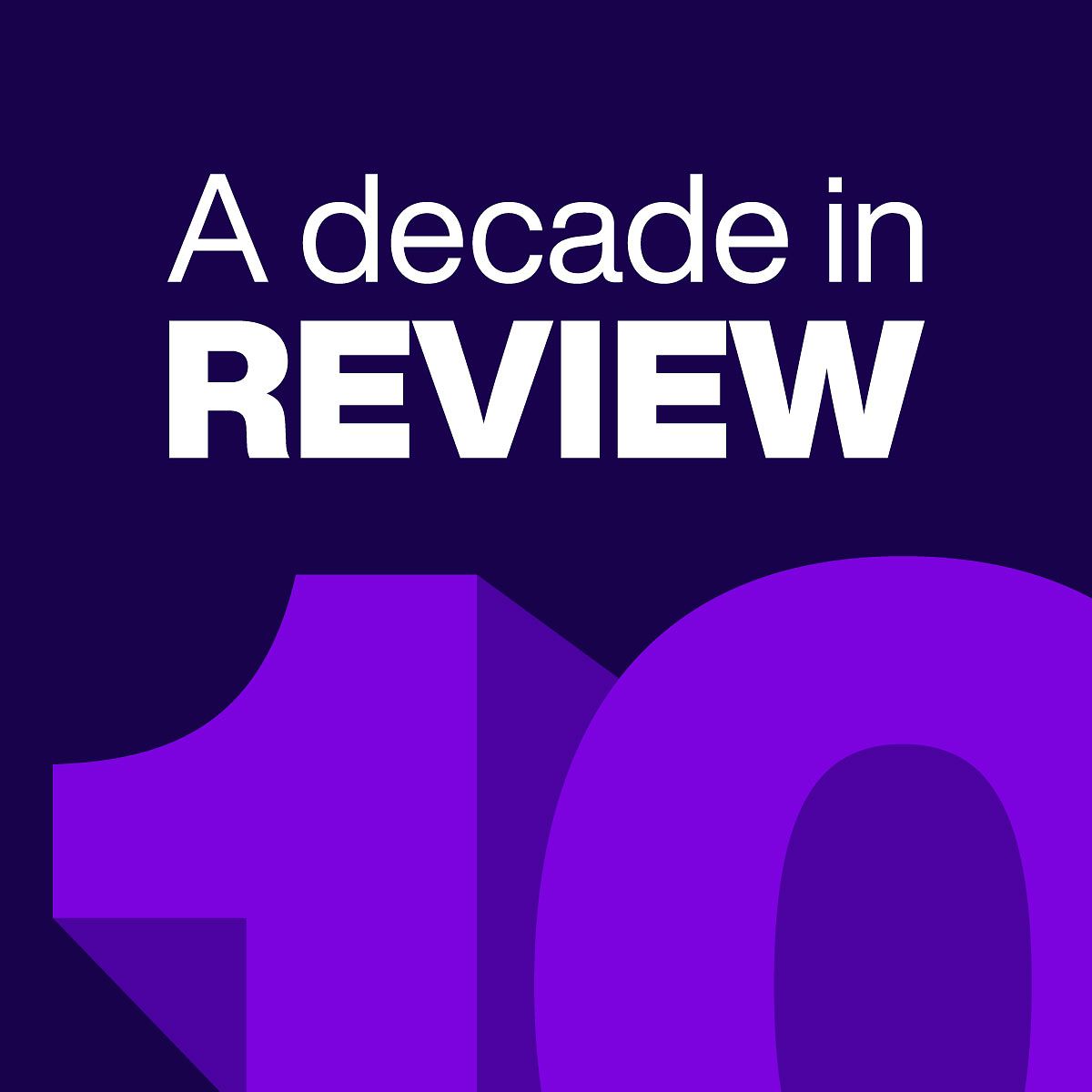
A decade in review

The most popular TED Talks in Hindi

How perfectionism fails us
Talks about psychology.

How to set the right goals and stay motivated

Are your coping mechanisms healthy?

What to do when you offend someone

Could psychedelics help patients in therapy?

Why you should talk about your anxiety at work

Even healthy couples fight — the difference is how

Why broken hearts hurt — and what heals them

The problem with being "too nice" at work

The bias behind your undiagnosed chronic pain

When is anger justified? A philosophical inquiry

How to know if you're being selfish (and whether or not that's bad)

How to get motivated even when you don’t feel like it

My mission to change the narrative of mental health

How stress drains your brain — and what to do about it

How to make smart decisions more easily

The science behind how sickness shapes your mood
Exclusive articles about psychology, a smart way to handle anxiety — courtesy of soccer great lionel messi, how do top athletes get into the zone by getting uncomfortable, here’s how you can handle stress like a lion, not a gazelle.
61 intriguing psychology research topics to explore
Last updated
11 January 2024
Reviewed by
Brittany Ferri, PhD, OTR/L
Short on time? Get an AI generated summary of this article instead
Psychology is an incredibly diverse, critical, and ever-changing area of study in the medical and health industries. Because of this, it’s a common area of study for students and healthcare professionals.
We’re walking you through picking the perfect topic for your upcoming paper or study. Keep reading for plenty of example topics to pique your interest and curiosity.
- How to choose a psychology research topic
Exploring a psychology-based topic for your research project? You need to pick a specific area of interest to collect compelling data.
Use these tips to help you narrow down which psychology topics to research:
Focus on a particular area of psychology
The most effective psychological research focuses on a smaller, niche concept or disorder within the scope of a study.
Psychology is a broad and fascinating area of science, including everything from diagnosed mental health disorders to sports performance mindset assessments.
This gives you plenty of different avenues to explore. Having a hard time choosing? Check out our list of 61 ideas further down in this article to get started.
Read the latest clinical studies
Once you’ve picked a more niche topic to explore, you need to do your due diligence and explore other research projects on the same topic.
This practice will help you learn more about your chosen topic, ask more specific questions, and avoid covering existing projects.
For the best results, we recommend creating a research folder of associated published papers to reference throughout your project. This makes it much easier to cite direct references and find inspiration down the line.
Find a topic you enjoy and ask questions
Once you’ve spent time researching and collecting references for your study, you finally get to explore.
Whether this research project is for work, school, or just for fun, having a passion for your research will make the project much more enjoyable. (Trust us, there will be times when that is the only thing that keeps you going.)
Now you’ve decided on the topic, ask more nuanced questions you might want to explore.
If you can, pick the direction that interests you the most to make the research process much more enjoyable.
- 61 psychology topics to research in 2024
Need some extra help starting your psychology research project on the right foot? Explore our list of 61 cutting-edge, in-demand psychology research topics to use as a starting point for your research journey.
- Psychology research topics for university students
As a university student, it can be hard to pick a research topic that fits the scope of your classes and is still compelling and unique.
Here are a few exciting topics we recommend exploring for your next assigned research project:
Mental health in post-secondary students
Seeking post-secondary education is a stressful and overwhelming experience for most students, making this topic a great choice to explore for your in-class research paper.
Examples of post-secondary mental health research topics include:
Student mental health status during exam season
Mental health disorder prevalence based on study major
The impact of chronic school stress on overall quality of life
The impacts of cyberbullying
Cyberbullying can occur at all ages, starting as early as elementary school and carrying through into professional workplaces.
Examples of cyberbullying-based research topics you can study include:
The impact of cyberbullying on self-esteem
Common reasons people engage in cyberbullying
Cyberbullying themes and commonly used terms
Cyberbullying habits in children vs. adults
The long-term effects of cyberbullying
- Clinical psychology research topics
If you’re looking to take a more clinical approach to your next project, here are a few topics that involve direct patient assessment for you to consider:
Chronic pain and mental health
Living with chronic pain dramatically impacts every aspect of a person’s life, including their mental and emotional health.
Here are a few examples of in-demand pain-related psychology research topics:
The connection between diabetic neuropathy and depression
Neurological pain and its connection to mental health disorders
Efficacy of meditation and mindfulness for pain management
The long-term effects of insomnia
Insomnia is where you have difficulty falling or staying asleep. It’s a common health concern that impacts millions of people worldwide.
This is an excellent topic because insomnia can have a variety of causes, offering many research possibilities.
Here are a few compelling psychology research topics about insomnia you could investigate:
The prevalence of insomnia based on age, gender, and ethnicity
Insomnia and its impact on workplace productivity
The connection between insomnia and mental health disorders
Efficacy and use of melatonin supplements for insomnia
The risks and benefits of prescription insomnia medications
Lifestyle options for managing insomnia symptoms
The efficacy of mental health treatment options
Management and treatment of mental health conditions is an ever-changing area of study. If you can witness or participate in mental health therapies, this can make a great research project.
Examples of mental health treatment-related psychology research topics include:
The efficacy of cognitive behavioral therapy (CBT) for patients with severe anxiety
The benefits and drawbacks of group vs. individual therapy sessions
Music therapy for mental health disorders
Electroconvulsive therapy (ECT) for patients with depression
- Controversial psychology research paper topics
If you are looking to explore a more cutting-edge or modern psychology topic, you can delve into a variety of controversial and topical options:
The impact of social media and digital platforms
Ever since access to internet forums and video games became more commonplace, there’s been growing concern about the impact these digital platforms have on mental health.
Examples of social media and video game-related psychology research topics include:
The effect of edited images on self-confidence
How social media platforms impact social behavior
Video games and their impact on teenage anger and violence
Digital communication and the rapid spread of misinformation
The development of digital friendships
Psychotropic medications for mental health
In recent years, the interest in using psychoactive medications to treat and manage health conditions has increased despite their inherently controversial nature.
Examples of psychotropic medication-related research topics include:
The risks and benefits of using psilocybin mushrooms for managing anxiety
The impact of marijuana on early-onset psychosis
Childhood marijuana use and related prevalence of mental health conditions
Ketamine and its use for complex PTSD (C-PTSD) symptom management
The effect of long-term psychedelic use and mental health conditions
- Mental health disorder research topics
As one of the most popular subsections of psychology, studying mental health disorders and how they impact quality of life is an essential and impactful area of research.
While studies in these areas are common, there’s always room for additional exploration, including the following hot-button topics:
Anxiety and depression disorders
Anxiety and depression are well-known and heavily researched mental health disorders.
Despite this, we still don’t know many things about these conditions, making them great candidates for psychology research projects:
Social anxiety and its connection to chronic loneliness
C-PTSD symptoms and causes
The development of phobias
Obsessive-compulsive disorder (OCD) behaviors and symptoms
Depression triggers and causes
Self-care tools and resources for depression
The prevalence of anxiety and depression in particular age groups or geographic areas
Bipolar disorder
Bipolar disorder is a complex and multi-faceted area of psychology research.
Use your research skills to learn more about this condition and its impact by choosing any of the following topics:
Early signs of bipolar disorder
The incidence of bipolar disorder in young adults
The efficacy of existing bipolar treatment options
Bipolar medication side effects
Cognitive behavioral therapy for people with bipolar
Schizoaffective disorder
Schizoaffective disorder is often stigmatized, and less common mental health disorders are a hotbed for new and exciting research.
Here are a few examples of interesting research topics related to this mental health disorder:
The prevalence of schizoaffective disorder by certain age groups or geographic locations
Risk factors for developing schizoaffective disorder
The prevalence and content of auditory and visual hallucinations
Alternative therapies for schizoaffective disorder
- Societal and systematic psychology research topics
Modern society’s impact is deeply enmeshed in our mental and emotional health on a personal and community level.
Here are a few examples of societal and systemic psychology research topics to explore in more detail:
Access to mental health services
While mental health awareness has risen over the past few decades, access to quality mental health treatment and resources is still not equitable.
This can significantly impact the severity of a person’s mental health symptoms, which can result in worse health outcomes if left untreated.
Explore this crucial issue and provide information about the need for improved mental health resource access by studying any of the following topics:
Rural vs. urban access to mental health resources
Access to crisis lines by location
Wait times for emergency mental health services
Inequities in mental health access based on income and location
Insurance coverage for mental health services
Systemic racism and mental health
Societal systems and the prevalence of systemic racism heavily impact every aspect of a person’s overall health.
Researching these topics draws attention to existing problems and contributes valuable insights into ways to improve access to care moving forward.
Examples of systemic racism-related psychology research topics include:
Access to mental health resources based on race
The prevalence of BIPOC mental health therapists in a chosen area
The impact of systemic racism on mental health and self-worth
Racism training for mental health workers
The prevalence of mental health disorders in discriminated groups
LGBTQIA+ mental health concerns
Research about LGBTQIA+ people and their mental health needs is a unique area of study to explore for your next research project. It’s a commonly overlooked and underserved community.
Examples of LGBTQIA+ psychology research topics to consider include:
Mental health supports for queer teens and children
The impact of queer safe spaces on mental health
The prevalence of mental health disorders in the LGBTQIA+ community
The benefits of queer mentorship and found family
Substance misuse in LQBTQIA+ youth and adults
- Collect data and identify trends with Dovetail
Psychology research is an exciting and competitive study area, making it the perfect choice for projects or papers.
Take the headache out of analyzing your data and instantly access the insights you need to complete your next psychology research project by teaming up with Dovetail today.
Should you be using a customer insights hub?
Do you want to discover previous research faster?
Do you share your research findings with others?
Do you analyze research data?
Start for free today, add your research, and get to key insights faster
Editor’s picks
Last updated: 18 April 2023
Last updated: 27 February 2023
Last updated: 5 February 2023
Last updated: 16 April 2023
Last updated: 16 August 2024
Last updated: 9 March 2023
Last updated: 30 April 2024
Last updated: 12 December 2023
Last updated: 11 March 2024
Last updated: 4 July 2024
Last updated: 6 March 2024
Last updated: 5 March 2024
Last updated: 13 May 2024
Latest articles
Related topics, .css-je19u9{-webkit-align-items:flex-end;-webkit-box-align:flex-end;-ms-flex-align:flex-end;align-items:flex-end;display:-webkit-box;display:-webkit-flex;display:-ms-flexbox;display:flex;-webkit-flex-direction:row;-ms-flex-direction:row;flex-direction:row;-webkit-box-flex-wrap:wrap;-webkit-flex-wrap:wrap;-ms-flex-wrap:wrap;flex-wrap:wrap;-webkit-box-pack:center;-ms-flex-pack:center;-webkit-justify-content:center;justify-content:center;row-gap:0;text-align:center;max-width:671px;}@media (max-width: 1079px){.css-je19u9{max-width:400px;}.css-je19u9>span{white-space:pre;}}@media (max-width: 799px){.css-je19u9{max-width:400px;}.css-je19u9>span{white-space:pre;}} decide what to .css-1kiodld{max-height:56px;display:-webkit-box;display:-webkit-flex;display:-ms-flexbox;display:flex;-webkit-align-items:center;-webkit-box-align:center;-ms-flex-align:center;align-items:center;}@media (max-width: 1079px){.css-1kiodld{display:none;}} build next, decide what to build next, log in or sign up.
Get started for free

Psychology topics
Psychology is a diverse discipline grounded in science, but with nearly boundless applications in everyday life. Scientific research conducted by psychologists can inform and guide those seeking help with issues that affect their professional lives, family relationships, and emotional wellness.
Featured topics

- Social media and the internet

- Healthy workplaces
All psychology topics
- Aging and older adults
- Alzheimer’s disease
- Artificial intelligence and machine learning
- Autism spectrum disorder
- Belief systems and religion
- Bipolar disorder
- Chronic illness
- Climate change
- Cognition and the brain
- Cognitive rehabilitation
- Disabilities
- Disasters and response
- Divorce and child custody
- Eating disorders
- Economic inequality
- Environment and population
- Equity, diversity, and inclusion
- Exercise and fitness
- Forensics, law, and public safety
- Forgiveness
- Gun violence and crime
- Health and behavior
- Health care
- Health equity
- HIV and AIDS
- Human rights
- Immigration and refugees
- Implicit bias
- Infants and toddlers
- Intelligence
- Journalism and facts
- Learning and memory
- Marriage and relationships
- Men and boys
- Mental health
- Military and veterans
- Mindfulness
- Neuropsychology
- Obsessive-compulsive disorder
- Personality
- Physical abuse and violence
- Population health
- Posttraumatic stress disorder
- Psychotherapy
- Race and ethnicity
- Racism, bias, and discrimination
- Rural populations
- Safety and design
- Schizophrenia
- Schools and classrooms
- Sex and sexuality
- Sexual assault and harassment
- Sexual orientation and gender diversity
- Socioeconomic status
- Sport and rehabilitation
- Substance use, abuse, and addiction
- Suicide and suicide prevention
- Testing, assessment, and measurement
- Video games
- Women and girls
Specialists are available for confidential telephone counseling.
The Go-To Science
Psychologists examine the relationships between brain function and behavior, and the environment and behavior, applying what they learn to illuminate our understanding and improve the world around us.
Science of Psychology

IMAGES
COMMENTS
Download the "Psychology of Decision-Making" presentation for PowerPoint or Google Slides. Healthcare goes beyond curing patients and combating illnesses. Raising awareness about diseases, informing people about prevention methods, discussing some good practices, or even talking about a balanced diet—there are many topics related to medicine ...
1 - Build A Structure. 2 - Apply The Rule Of Three. 3 - Change Every 10 Minutes. 4 - Use Emphasizing Visual Communication. 5 - Use Impactful Headlines. 6 - Don't Read The Slides. 7 - Share A Story. Conclusion Of Key Points: Tapping Into The Human Brain With Presentation Psychology.
These presentation templates with a psychology theme are suitable for presentations related to mental health, therapy, research, or educational purposes. They can be used by psychologists, therapists, researchers, educators, or anyone looking to present information on psychology-related topics.
In this presentation, Kyler Shumway shares his strategies for making snazzy (but professional) slideshow presentations. Learn how to use the latest technology to augment visual communication while avoiding some of the classic presentation blunders. Other topics include: animation basics. simple data visualization.
10. Prepare your success rituals and mantra. Public speakingand/or stage fright can feel debilitating for some. Have your calm-down ritual prepared and ready to go before you start your ...
article continues after advertisement. 4. Help your audience prioritize. Pity the poor human brain, remembering everything. Help it along by giving your audience hierarchies of importance, numbers ...
Topics in Psychology. Explore how scientific research by psychologists can inform our professional lives, family and community relationships, emotional wellness, and more. ... It is important to note that white space may not always be white. Each presentation should have its own color palette that consists of approximately three complementary ...
Psychology 101 Presentation . Multi-purpose . Premium Google Slides theme, PowerPoint template, and Canva presentation template ... Disney Templates with your favorite Disney and Pixar characters Slidesclass Ready-to-go classes on many topics for everyone Editor's Choice Our favorite slides Multi-purpose Presentations that suit any project ...
Use psychology research to make your slide powerful, says Harvard professor emeritus Stephen M. Kosslyn, PhD, whose book "Clear and to the Point: 8 Psychological Principles for Compelling PowerPoint Presentations" explains how to use what cognitive scientists know about information processing to enhance presentation slides.
Psychology presentation. A free template for presentations on psychology, perfect for sharing knowledge about the mind, emotions, and well-being. Ideal for teaching therapies, psychotherapy, and promoting personal growth.
Effective presentations go beyond creating captivating and visually appealing slides. To truly win the audience's hearts, presenters must invest much of their time and energy in trying to understand them and their psychology. This entails researching the audience's backgrounds and tailoring the presentation according to their needs and requirements. This article delves into the details […]
Fourth, help your audience prioritize. Pity the poor human brain, remembering everything. Help it along by giving your audience hierarchies of importance, numbers, and signals of how essential ...
Let's see how you can use psychology to create an impactful presentation. 1. Take Care of the Learning Style. Let's find out the 3 learning ways called the VAK model. According to the model, people essentially are three kinds of learners -. Visual learners - They learn better with visual content like bars, graphs, charts, mind maps ...
Free PowerPoint template and Google Slides theme. Template with a shadow overlay. Agnes is a beautiful inspirational slides theme. The shadow overlay gives it a unique touch and it can be easily adapted to different topics by simply changing the images of the plants, for pictures that represent your presentation […]
Positive Psychology Presentation . Education . Free Google Slides theme, PowerPoint template, and Canva presentation template ... Disney Templates with your favorite Disney and Pixar characters Slidesclass Ready-to-go classes on many topics for everyone Editor's Choice Our favorite slides Multi-purpose Presentations that suit any project ...
Data. Data visualizations can elevate your presentation from being a good one to a great one. By providing data behind your arguments, you'll appear more trustworthy and confident in your audience's eyes. Add charts, graphs, interactive maps, and more to your presentations with Prezi Design. You can choose from a wide selection of charts ...
A successful presentation can be achieved by writing your speech first, leading with an outline, using sentence fragments and smart fonts, using graphs and summarizing. ... Topics in Psychology. Explore how scientific research by psychologists can inform our professional lives, family and community relationships, emotional wellness, and more.
Create an attractive and in-depth presentation using our psychology creative presentation template! By Venngage Inc. Create. 100% customizable templates. Millions of photos, icons, charts and graphics. AI-powered editing features. Effortlessly share, download, embed and publish. Easily generate QR codes for your designs. Template details.
200 Positive Psychology Topics. February 16, 2024 by Jessica Scott. These topics cover various aspects of positive psychology, including happiness, resilience, and personal growth, providing valuable insights for students, professionals, and anyone keen on exploring the science of a fulfilling life. The Science of Happiness: Understanding Its ...
Topics of Psychology Research Related to Human Cognition. Some of the possible topics you might explore in this area include thinking, language, intelligence, and decision-making. Other ideas might include: Dreams. False memories. Attention. Perception.
Here's how you can handle stress like a lion, not a gazelle. It's all about being able to see the daily nerve-racking events in your life as challenges -- instead of threats -- and stress expert Elissa Epel PhD explains how we can all start to make this shift. Posted Feb 2023. See all articles on Psychology.
Examples of systemic racism-related psychology research topics include: Access to mental health resources based on race. The prevalence of BIPOC mental health therapists in a chosen area. The impact of systemic racism on mental health and self-worth. Racism training for mental health workers.
Psychology topics. Psychology is a diverse discipline grounded in science, but with nearly boundless applications in everyday life. Scientific research conducted by psychologists can inform and guide those seeking help with issues that affect their professional lives, family relationships, and emotional wellness. ...